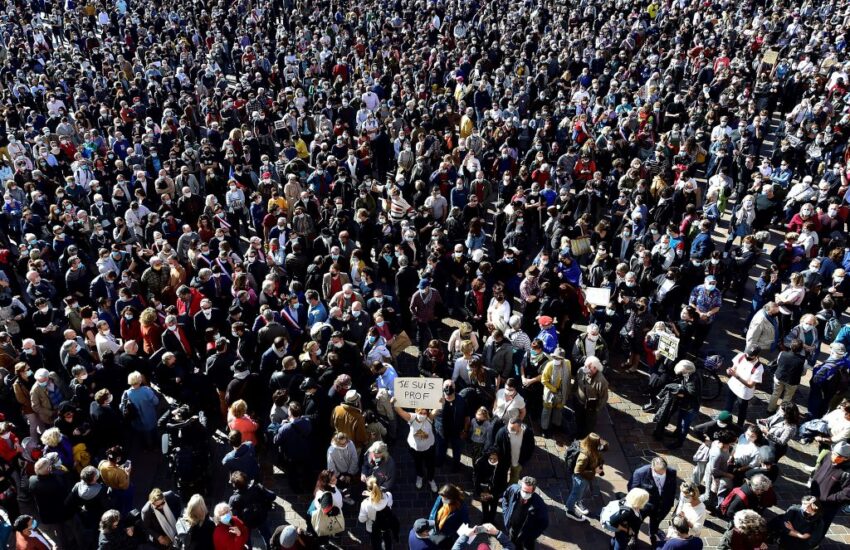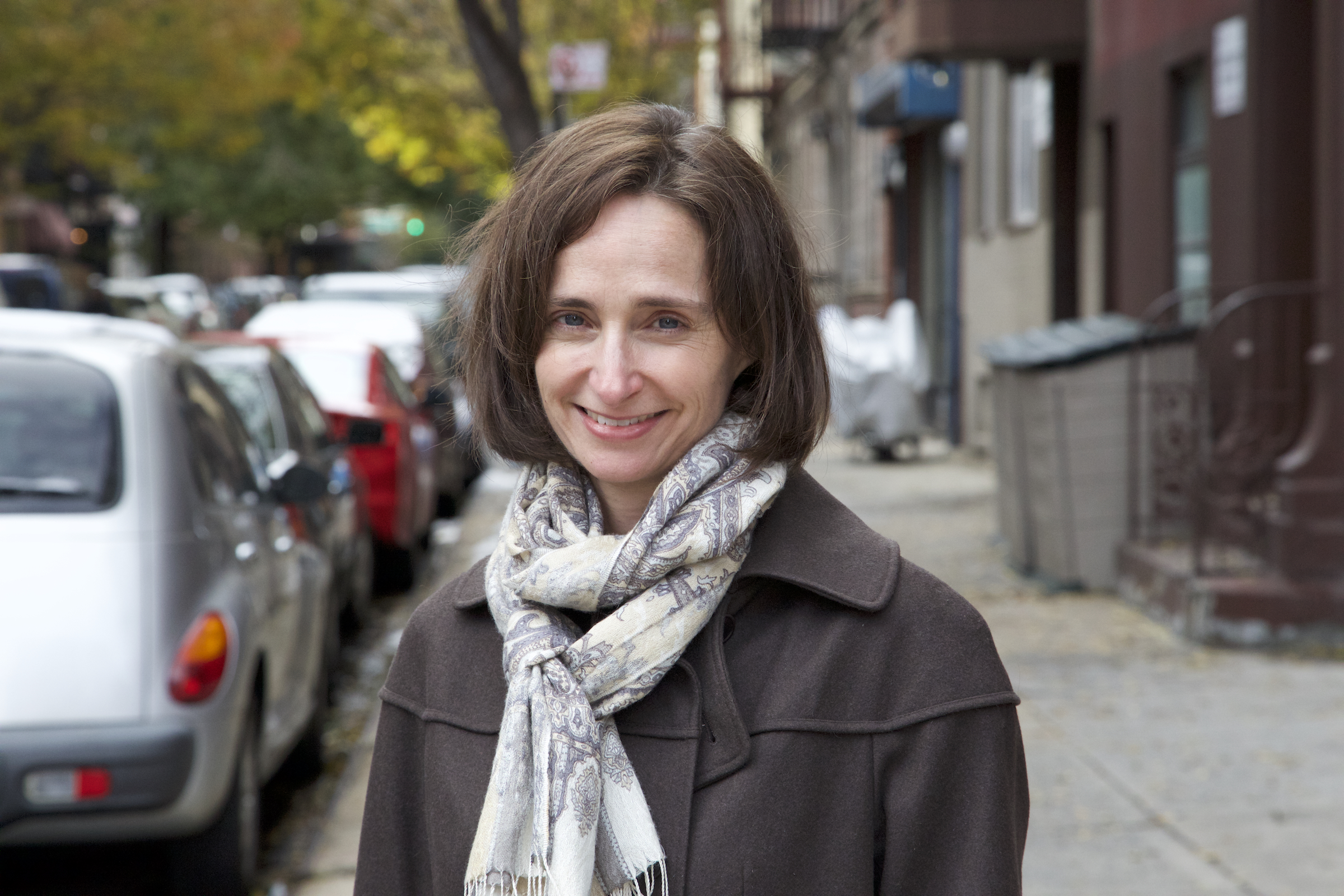In a letter to the Lycée community on October 18, Evelyne Estey, the Lycée’s head of school, paid tribute to Samuel Paty, the French history-geography teacher who was killed outside his school, and teachers everywhere. Mr. Paty had been guiding his students in a discussion of freedom of expression around the trial relating to the 2015 attack against Charlie Hebdo, the satirical newspaper in France.
“Now, as much as ever, we are reminded of the essential role teachers play, including our own, in educating students to think critically, to embrace differences, to deepen their understanding of themselves and one another, and to become engaged, active stewards of civic life,” she wrote. “We remain as determined as ever in the pursuit of our educational mission.”
On October 22, the Lycée joined the French Consulate in New York in a 9am minute of silence in honor of Samuel Paty. Later in the day, the Consulate held an interfaith conversation about freedom of expression and the French concept of laïcété in tribute to Samuel Paty via Zoom. Two history-geography teachers from the Lycée, Pierre Lagaude and Arthur Plaza, were invited to participate in the gathering, joining Jérémie Robert, Consul General of France; Dr. Isma Chaudhry, Chair, Islamic Center of Long Island; Annie Michel, Teacher and elected representative of French citizen abroad; David Harris, CEO, American Jewish Committee, and Gaetan Bruel, Cultural Counselor of the Embassy.
Here is what our teachers said:
Mr. Pierre Lagaude, History-Geography Teacher
À 9 heures ce matin, une minute de silence a été respectée au sein de notre Lycée, online, mais aussi en présentiel, car nous avons la chance, dans le contexte actuel, de pouvoir accueillir nos élèves dans nos locaux.
Cette minute a été précédée de la lecture de quelques mots présentant le contexte de cet hommage à notre collègue qui est mort en faisant simplement son travail, notre travail. Cette minute a été respectée par tous avec beaucoup d’émotion.
Elle a permis aussi de mettre de nouveau en avant les valeurs de notre Lycée, qui sont aussi les valeurs de l’école de la République française : la défense des libertés fondamentales, et notamment la liberté d’expression, ainsi que l’ouverture et la tolérance.
Pour transmettre ces valeurs, le rôle éducatif de l’école et des enseignants est évidemment fondamental. Ce rôle passe par la transmission de savoirs mais aussi, de plus en plus, de savoir-être. Ce rôle est d’autant plus important dans un contexte actuel hélas marqué par la division et la conflictualité, tant aux Etats-Unis qu’en France.
Samuel Paty était comme vous le savez professeur d’histoire-géographie. Son assassinat a notamment pour but de nous faire peur et de nous censurer, mais cela n’arrivera pas. Cela n’arrivera pas car notre quotidien et notre vocation sont de transmettre les valeurs de tolérance et de liberté, grâce au respect de nos programmes. L’histoire et la géographie offrent ainsi des clefs pour mieux affronter les défis actuels.
En 5ème par exemple, pas plus tard qu’hier, j’ai enseigné à mes élèves les contacts et les échanges qui ont eu lieu durant le Moyen-Age en Méditerranée, entre la civilisation chrétienne et la civilisation arabo-musulmane, afin de montrer que certes ces contacts était parfois conflictuels, mais qu’ils pouvaient également reposer sur le vivre ensemble, comme en Sicile ou au Sud de l’ Espagne.
J’ai aussi il y a peu de temps enseigné à mes Premières les Lumières, qui ont permis l’affirmation de la raison sur l’obscurantisme.
Les professeurs d’histoire-géographie en France et au Lycée français de New York enseignent aussi l’éducation morale et civique, qui a trois finalités : le respect d’autrui, la construction d’une culture civique et l’acquisition des valeurs de la République.
Parmis ces valeurs, outre celles déjà mentionnées, celle de la laïcité est fondamentale. Elle repose sur la liberté de chacun de croire ou de ne pas croire, mais aussi sur la neutralité de l’Etat et sur la séparation entre les cultes et la République. Cette conception de la laïcité à la française est parfois source de confusions, d’approximations et de débats. En France déjà, où une conception radicale et ferme s’oppose à une conception plus libérale, mais aussi aux EU, où le contexte historique et social engendre parfois une incompréhension mutuelle. C’est en ce sens que nous avons pris l’initiative, au Lycée, d’organiser bientôt une rencontre afin d’oeuvrer à une meilleure entente. Je laisse le soin à mon collège Arthur de vous en parler également.
Thank you very much for your attention.
From Dr. Arthur Plaza, Chair, History-Geography Department
I would like to extend my deepest condolences to all the citizens of France and to all my colleagues, teachers in Éducation nationale for their loss. We extend our empathy to you as you live through the trauma.
Having survived the trauma of two terrorist attacks on New York, I would like to echo the words of Dr. Isma Chaudry of the Islamic Center of Long Island. It is only through solidarity with one another that we can overcome our grief and reinforce the foundation of our democracy through our shared values. In this way, we will resist the attacks of religious extremists.
I have been privileged to teach students at the Lycée français for 14 years. We teach our students to embrace diversity and develop intercultural understanding as they encounter multiple cultures at school every day.
In the American context, it’s helpful to invoke the pioneering work of Alexis de Tocqueville On Democracy in America. The French social observer recognized, through his travels in the 1830s, that the strength of American democracy resided in its religious pluralism. In the prior century, the framers of the U.S. Constitution understood this specificity when they placed freedom of speech and freedom of religion in the First Amendment. They placed these two freedoms on an equal plane.
At school, we strive to create the space for all forms of diversity, especially political diversity, so critical to a well-functioning democracy. We emphasize civil discourse as we encourage students to share their views and apply their esprit critique when evaluating arguments.
Teaching mutual respect and tolerance is at the core of our instruction at the Lycée. When my students read Voltaire’s Traité sur laTolérance, they appreciate the philosophe’s argument for the fraternity of all humankind. Several years ago we partnered with the Tanenbaum Center for Interreligious Understanding to develop Days of Understanding for students from Maternelle through middle school. Their purpose is to encourage students to share their religious backgrounds to foster dialogues at school, where we ensure everyone exercises the freedom to believe or not to believe.
Thanks to generous support from the Consulate General of France, we’ve been able to invite Rabbi Delphine Horvilleur and Islamic scholar Rachid Benzine to address our students. The two co-authors of 1001 Façons d’être juif ou musulmane modeled interreligious dialogue. They challenged our students to overcome religious stereotypes and discussed the practice of Republican citizenship. Their message stressed the necessity for religious believers to be self-critical in order to confront and denounce religious extremism.
Our Cultural Center is preparing a series of panels on the freedom of expression and the French concept of laïcité in the coming weeks.
In conclusion, we pay tribute to Samuel Paty who lost his life while fulfilling his mission in the service of students. There’s no greater sacrifice a teacher can make. We honor his memory by teaching our students the values he held dear. His legacy shall live on. Our democracies depend on it.
Featured image photo credit: AFP/Gobet via AFP, shows a protest in Toulouse on October 18 in honor of Samuel Paty.
About the Author :
Elisabeth King joined the Lycée team in November 2011 as the school’s first director of communications. A francophile at heart, Elisabeth spent her junior year of college in Paris, and held her first job at the French Trade Office here in New York. She brings to the Lycée over 15 years of experience in media and communications in non-profits, government, news and business. She was previously executive vice president and director of strategy at ABI, Inc., a boutique public relations agency, and she worked as associate editor on two books co-authored by Todd Brewster and the late ABC News anchor Peter Jennings.


